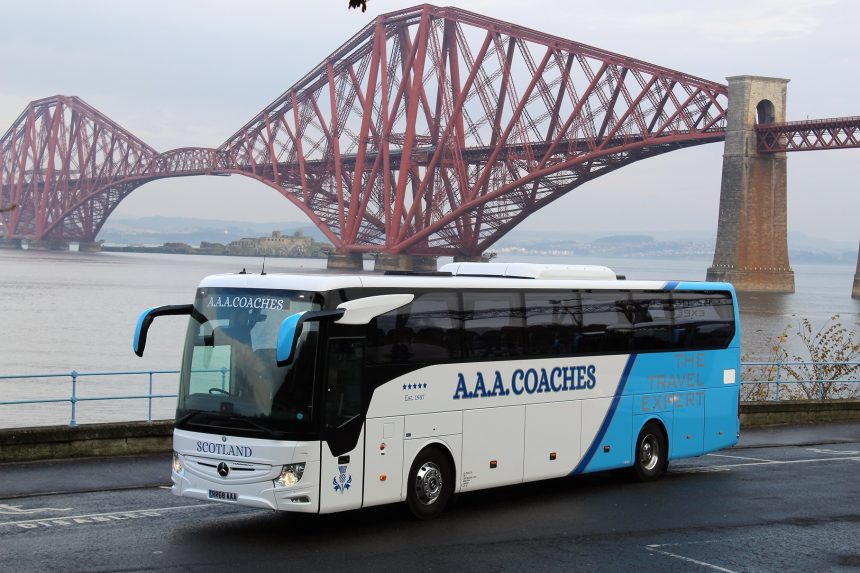PSVAR is a hot topic, particularly its application to coaches. But for some coach operators, it is also highly divisive. Some believe it is overkill and support exemptions. Others disagree, based on the investment they have already made to comply.
routeone engaged with a cross section of the industry. Most of those who replied primarily run coaches, but one operator only with buses contributed too. A transport consultant also had his say.
Collectively, their views give food for thought where possible future scenarios involving PSVAR are concerned, whether those involve further exemptions or a mandate for outright compliance.
Regardless of their side of the fence, most of those who responded believe that the Regulations in their current form require changes to take account of real-life operating scenarios.
PSVAR preparations began early for some with coaches
Some coach operators began preparation for PSVAR early, investing heavily to ensure that their fleets satisfied the 1 January deadline. South Staffs Coach Hire of Tamworth was among them, but it was not an easy process, says Partner Graham Bethell.
“In 2019 we spent more than we have ever done to meet the Regulations,” he explains. “But used PSVAR compliant coaches are few and far between. Add Euro VI to the mix and they are nigh on impossible to purchase.”
South Staffs sourced some Caetano Levante-bodied Volvo B9Rs that are compliant. But finding examples that did not show signs of a previous hard life was difficult, adds Mr Bethell. “They came at a premium. Retrofitting them to Euro VI is our next costly hurdle.”
Compliance with PSVAR had been achieved by South Staffs, but at significant cost. It terminated a “healthy and viable” home to school contract requiring a 70-seat coach that could pass below a 3.5m bridge owing to difficulties in finding such a compliant vehicle.
But that was just the beginning. The last piece in South Staffs’ jigsaw was the purchase of a compliant double-decker bus. It replaced a “perfectly good” but non-PSVAR example with coach seats.
“I returned to my office to see that with just 30 hours to go before implementation, PSVAR relating to some home to school work had been given a further partial relaxation until 31 July as the industry was not ready,” says Mr Bethell.
“The coaches we purchased at a premium are no longer desirable in the short term. Rates will dwindle as demand for them has dropped. Chopping and changing at the last minute is shambolic.”
‘Will the goalposts move again?’, one operator wonders
Application of PSVAR to home to school services should be examined and if necessary overhauled, says Greg White, Director of White’s St Albans.
Mr White acknowledges that when it is unknown in advance who will board, “access is of course a necessity.” However, he questions whether PSVAR should apply to closed-door contracts where it is known beforehand that no passengers will require concessions to accessibility.
He also questions why all vehicles used on rail replacement should be accessible when there is no requirement for every train carriage to be.
Carl Stott, Director of Milnsbridge-based Stotts Coach Travel, agrees that open-door services should satisfy PSVAR. Stotts’ home to school fleet is fully compliant. Like Mr Bethell, he notes that operators that invested early are now at a disadvantage as a result of exemptions.
“If there is a further rethink on home to school transport and the goalposts are moved, what will happen to those of us that have invested heavily to comply? Will we be compensated? I think not.” Mr Stott reinforces the point that the combination of PSVAR and a move towards Euro VI is difficult to swallow for many operators.
He suggests that standards for Clean Air Zones and Scotland’s Low Emission Zones should have been staggered, starting with Euro V before moving to Euro VI. Euro VI and PSVAR have caused values of used coaches outside the scope of either “to plummet,” he says.
‘Coaches should have moved faster on PSVAR’
Transport Consultant James Fairchild has “considerable sympathy” with operators that did not prepare for PSVAR. But that is no excuse for non-compliance, he adds.
In fact, Mr Fairchild says that he and two Yorkshire operators that he represents are “happy to support” ongoing legal challenges to exemptions for both some home to school duties and rail replacement work.
“We must not lose sight of the fact that disabled children, by and large, would choose to travel on the same vehicle as their peers.” He also notes that the Equality Act 2010 includes a general duty to make reasonable adjustments for disabled people.
“That applies to any type of work, including day trips, private hire, etc. Those advocating for unprepared operators ought to take special note.”
Craig Temple, MD of Connexionsbuses of Harrogate, says that many bus operators previously found themselves in the same position that coach operators do currently. But, he adds, his and other businesses dealt with it and complied.
Mr Temple also looks at the matter from a local authority’s (LA) point of view. Although rates may increase to accommodate PSVAR compliant vehicles, he says that LAs could then move disabled passengers from taxis or minibuses onto them, reducing expenditure.
“If LAs do not bring those passengers into the mainstream, PSVAR is a costly, pointless exercise.”
That notwithstanding, Mr Temple backs up a point that has been made already: Many rural pick-up points for home to school services are not suitable for the safe deployment of a wheelchair lift or ramp.
Is it actually the Department’s fault?
Tom Grindle, General Manager of Grindles Coaches of Cinderford, disagrees with suggestions that operators should have recognised PSVAR well in advance. It was not made clear from the outset that home to school transport in its entirety would be in scope, he says.
“To suggest that those operators that did not prepare should close down their businesses is unfair. We were not in that position by choice, but through ambiguity. Surely that is proven by the number of operators that were, as some have said, ‘unprepared’.”
Although the later exemption superseded it, Grindles had reached an agreement with a local school to allow continuing provision of services with non-PSVAR coaches beyond 1 January. But that came at a cost, says Mr Grindle.
“The school was ready to not charge students to allow us to continue operating services until an agreed deadline, by which time we would have purchased PSVAR compliant vehicles.
“For the five routes that it procures from two operators, that would have cost it £1,000 per day. It would have been a massive chunk out of an already tight budget.”
Backward step for overall vehicle quality?
Mr Grindle previously worked in a school. He says he understands the need for inclusivity. However, he argues that as disabled students have usually been conveyed separately without fuss, the need for PSVAR compliance across the board is superfluous.
What is clear is that with PSVAR compliant coaches will come a need for higher rates. On that, Mr Grindle says that undercutting remains an issue. He also suggests that the average age of vehicles will potentially go backwards when, or if, PSVAR is enforced fully.
“With the increased cost of compliant vehicles due to demand, and the reduced resale value of those that are non-compliant, the figures do not necessarily lend themselves to purchasing replacements of a similar age and quality.
“A Caetano Levante has already been worked hard. Some have covered over 1m km. Their running costs could be considerably higher. That will further hit profit margins.”
Is PSVAR retrofit a viable solution?
Retrofit of non-compliant coaches to achieve PSVAR is an option in some cases. But the operator needs to make such an exercise stack up financially. That may be difficult, says Mr Grindle.
Moving towards compliant buses does not appeal to Grindles. It would reduce versatility and means that if the company is to cover the same work as pre-PSVAR, additional vehicles will be required. Justifying the fixed costs of those will be difficult.
AAA Coaches of Edinburgh is another operator to have examined upgrading existing stock to satisfy PSVAR. Quotes of up to £40,000 were received, says Sales and Marketing Director David Maloney.
He adds that if a deadline for PSVAR on all home-to-school and rail replacement work was extended by two years, compliance would be achieved by natural fleet replacement. As it is, the immediate problem led AAA to purchase an older but compliant vehicle.
Doing that is not AAA’s normal policy. Over the past years it has invested millions in new coaches. It previously ran PSVAR compliant examples but found that their access aids were seldom, if ever, used. It is now looking at a deal for three new additions.
Like Mr Grindle, Mr Maloney generally accepts a requirement for accessibility. But he adds that PSVAR was poorly publicised. Government financial assistance towards achieving compliance would have been welcomed by the industry, he continues.
“We have 12 coaches that work for one private school. We will have to get them compliant. This has put us in a financial predicament. It is a huge blow to our business.”
routeone comment
Arguments from both corners about PSVAR are compelling. Some operators that allege ambiguity in the Regulations’ wording form a cohesive case. Those who take the view that there was more than enough time to comply articulate their thoughts well.
Calls for a fresh look at PSVAR’s extent have merit in some cases. It remains to be seen how likely they are to be heeded. Realistically they will not be. It has already been suggested that for home to school work, DfT is not minded to issue further exemptions.
Those operators who invested to ensure compliance should not be forgotten. They have spent hundreds of thousands of pounds only to see last-minute exemptions issued. It’s difficult not to sympathise.
More than one contributor expects some operators to cease in-scope work altogether to avoid PSVAR. That may be a blessing in disguise if rates are to rise to cover the additional costs of providing compliant vehicles.


























